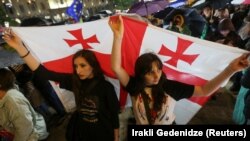In 2008, using tactics similar to those it later utilized in eastern Ukraine, Russia exacerbated and fomented unrest in northern Georgia, its neighbor in the southern Caucasus. Under the pretext of protecting its citizens in Georgia’s regions of Abkhazia and South Ossetia, Russia attacked the former Soviet Republic on August 1, 2008.
In the process, about a thousand Georgians died, and another 300 thousand were displaced, most of them ethnic Georgians.
“Fifteen years ago, Russia’s aggression upended the lives and livelihoods of millions of Georgia’s civilians,” said Acting Deputy Representative to the United Nations Jeffrey DeLaurentis. “Many of these individuals remain unable to return to their pre-conflict lives and homes. Many remain unable to enjoy peace and security.”
On August 25, 2008, the Russian Federation officially recognized Abkhazia and South Ossetia as independent nations. Four other countries have joined Russia in doing so, while most others consider the break-away republics to be a part of Georgia. However, Russian troops stationed in Abkhazia and South Ossetia, effectively enforce the separation of Georgia from about one fifth of its territory.
“The United States fully supports Georgia’s sovereignty, independence, and territorial integrity within its internationally recognized borders,” said Ambassador DeLaurentis. “Russia’s military presence in the Georgian regions of Abkhazia and South Ossetia are the result of its unlawful invasion.”
“Russia continues to violate the territorial integrity of Georgia and undermines Georgia’s sovereignty, threatening not only Georgia but also the principles enshrined in the UN Charter,” he said.
“We call on Russia to cease its recognition of the so-called independence of the Georgian regions of Abkhazia and South Ossetia, which are integral parts of Georgia’s territory. We also call on Russia to fulfill its obligations under the 2008 ceasefire agreement to withdraw its forces to pre-conflict positions, and to allow and facilitate unhindered access for humanitarian organizations.”
“Russia and the de facto authorities in Abkhazia and South Ossetia,” said Ambassador DeLaurentis, “need to take immediate steps to respect human rights in Abkhazia and South Ossetia, cease construction of barriers along the administrative boundary lines, and create security conditions conducive to the voluntary, safe, dignified, and unhindered return and reintegration of internally displaced persons and refugees.”






